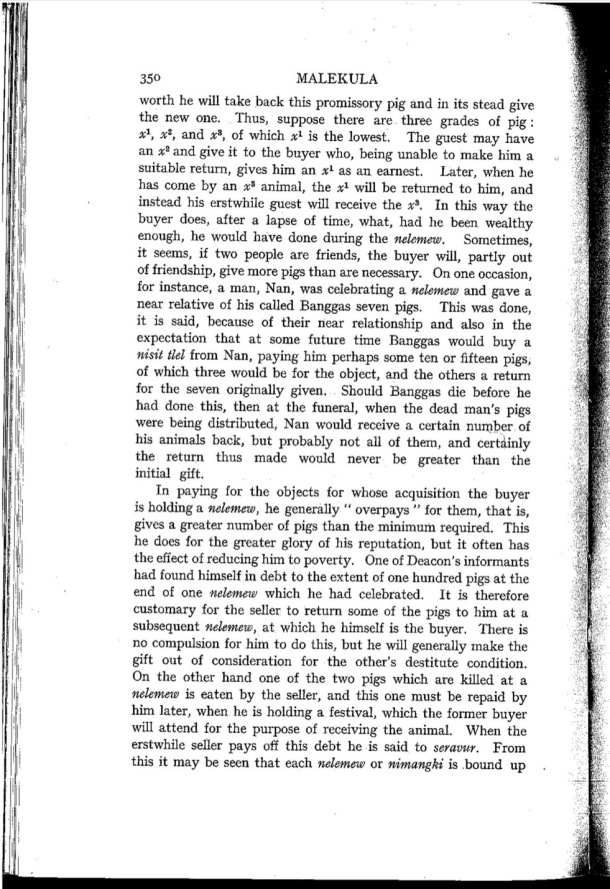|
|  [Note: this transcription was produced by an automatic OCR engine]
t
1“
ii
ll.
., ll
ll
I‘
l l
350 MALEKULA
worth he will take back this promissory pig and in its stead give
the new one. Thus, suppose there are three grades of pig :
x‘, xi, and 1', of which x‘ is the lowest. The guest may have
an ac" and give it to the buyer who, being unable to make him a
suitable return, gives him an x1 as an earnest. Later, when he
has come by an x‘ animal, the x1 will be returned to him, and
instead his erstwhile guest will receive the x‘. In this way the
buyer does, after a lapse of time, what, had he been wealthy
enough, he would have done during the mlemsw. Sometimes,
it seems, if two people are friends, the buyer will, partly out
of friendship, give more pigs than are necessary. On one occasion,
for instance, a man, Nan, was celebrating a mlemew and gave a
near relative of his called Banggas seven pigs. This was done,
it is said, because of their near relationship and also in the
expectation that at some future time Banggas would buy a
nisit tlel from Nan, paying him perhaps some ten or ï¬Åfteen pigs,
of which three would be for the object, and the others a return
for the seven originally given. Should Banggas die before he
had done this, then at the funeral, when the dead man's pigs
were being distributed, Nan would receive a certain number of
his animals back, but probably not all of them, and certainly
the return thus made would never be greater than the
initial gift.
In paying for the objects for whose acquisition the buyer
is holding a nelemzw, he generally " overpays " for them, that is,
gives a greater number of pigs than the minimum required. This
he does for the greater glory of his reputation, but it often has
the effect of reducing him to poverty. One of Deacon's informants
had found himself in debt to the extent oi one hundred pigs at the
end of one nelemew which he had celebrated. It is therefore
customary for the seller to return some of the pigs to him at a
subsequent nelemew, at which he himself is the buyer. There is
no compulsion for him to do this, but he will generally make the
gift out of consideration for the 0ther’s destitute condition.
On the other hand one of the two pigs which are killed at a
mlemezll is eaten by the seller, and this one must be repaid by
him later, when he is holding a festival, which the former buyer
will attend for the purpose of receiving the animal. When the
erstwhile seller pays oft this debt he is said to seravur. From
this it may be seen that each nelemew or nimangki is bound up
3"
t:
1
.. l
»,.
1., :
<5 _.
z
h
~:
‘.1 i-
-... ,
.2-1..
11>}...
PK" Q
4, .
Til ;,.
r
v
,
ii
.,;.
i J. 1‘ ’
»;: ,1
;: ~
|